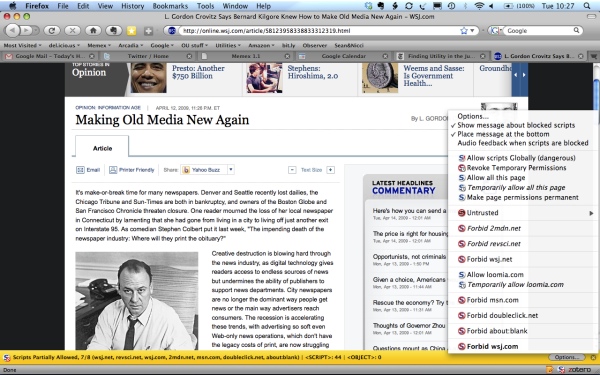One of the case studies I use in lectures about media ecology is how newspapers in the 1950s adapted to the emergence of television. But actually there’s an even better example — which is how newspapers adapted (or failed) to the challenge of radio. The WSJ has a lovely example of this in a piece by L. Gordon Crovitz prompted by a new biography of Barney Kilgore, the editor who transformed the Journal in the 1940s.
As the remaining city newspapers rethink themselves, editors and publishers might consult a road map for how newspapers can live alongside new media that was drawn up more than 50 years ago by Bernard Kilgore, outlined in a new biography by former Journal executive Richard Tofel, Restless Genius: Barney Kilgore, The Wall Street Journal and the Invention of Modern Journalism.
Kilgore had remarkable judgment early about the journalistic issue of our day: how readers use old media, new media and both. When Kilgore became managing editor of the Journal in 1941, he inherited a business model that technology had undermined. Founded in 1889 to provide market news and stock prices to individual investors, the Journal lost half its circulation as this basic information became widely available.
Kilgore observed that then new media such as radio meant market news was available in real time. Some cities had a dozen newspapers that had gained the Journal's once-valuable ability to report share prices.
The Journal had to change. Technology increasingly meant readers would know the basic facts of news as it happened. He announced, “It doesn’t have to have happened yesterday to be news,” and said that people were more interested in what would happen tomorrow. He crafted the front page “What’s News — ” column to summarize what had happened, but focused on explaining what the news meant.
On the morning after Pearl Harbor, other newspapers recounted the facts already known to all the day before through radio. The Journal’s page-one story instead began, “War with Japan means industrial revolution in the United States.” It outlined the implications for the economy, industry and commodity and financial markets.
If you wanted an illustration of the mindset newspapers need to cope with the challenge of the Internet, then that Pearl Harbor story is it in a nutshell.

